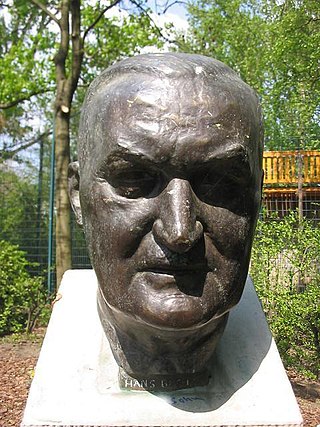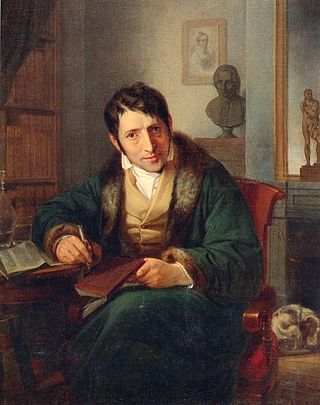
Einhard was a Frankish scholar and courtier. Einhard was a dedicated servant of Charlemagne and his son Louis the Pious; his main work is a biography of Charlemagne, the Vita Karoli Magni, "one of the most precious literary bequests of the early Middle Ages".

Matilda of Ringelheim, also known as Saint Matilda, was a Saxon noblewoman. Due to her marriage to Henry I in 909, she became the first Ottonian queen. Her eldest son, Otto I, restored the Holy Roman Empire in 962. Matilda founded several spiritual institutions and women's convents. She was considered to be extremely pious, righteous and charitable. Matilda's two hagiographical biographies and The Deeds of the Saxons serve as authoritative sources about her life and work.

Emil Nolde was a German-Danish painter and printmaker. He was one of the first Expressionists, a member of Die Brücke, and was one of the first oil painting and watercolor painters of the early 20th century to explore color. He is known for his brushwork and expressive choice of colors. Golden yellows and deep reds appear frequently in his work, giving a luminous quality to otherwise somber tones. His watercolors include vivid, brooding storm-scapes and brilliant florals.
The Centre Against Expulsions was a planned German documentation centre for expulsions and ethnic cleansing, particularly the expulsion of Germans after World War II. Since March 19, 2008 the name of the project is Sichtbares Zeichen gegen Flucht und Vertreibung.

Joachim Ringelnatz is the pen name of the German author and painter Hans Bötticher (7 August 1883, Wurzen, Saxony – 17 November 1934, Berlin). His pen name Ringelnatz is usually explained as a dialect expression for an animal, possibly a variant of Ringelnatter, German for grass snake or more probably the seahorse for winding ("ringeln") its tail around objects. The seahorse is called Ringelnass by mariners, an occupation to which he felt kinship. He was a sailor in his youth and spent the First World War in the Navy on a minesweeper. In the 1920s and 1930s, he worked as a Kabarettist, i.e., a kind of satirical stand-up comedian. He is best known for his wry poems using word play and sometimes bordering on nonsense poetry. Some of them are similar to Christian Morgenstern's, but more satirical in tone and occasionally subversive. His most popular character is the anarchic sailor Kuddel Daddeldu with his drunken antics and disdain for authority.

The Robert Bosch Stiftung GmbH is a German foundation that owns a majority shareholding in Robert Bosch GmbH, from which it derives its funding. The foundation was established in accordance with the wishes of Robert Bosch, who died in 1942, and conducts and finances social, cultural and scientific projects.

Hermann Otto Solms is a German politician of the Free Democratic Party (FDP).

The Prussian Cultural Heritage Foundation is a German federal government body that oversees 27 museums and cultural organizations in and around Berlin, Germany. Its purview includes all of Berlin's State Museums, the Berlin State Library, the Prussian Privy State Archives and a variety of institutes and research centers. As such, it is one of the largest cultural organizations in the world, and also the largest cultural employer in Germany with around 2,000 staff as of 2020. More than four million people visited its museums in 2019.

Claus-Detlev Walter Kleber is a German journalist and former lawyer. He anchored heute-journal, an evening news program on ZDF, one of Germany's two major public TV stations. He is also known for his expertise in United States politics and German-American relations, as evidenced by his 2005 bestseller Amerikas Kreuzzüge.

Hans Böckler was a German politician and trade union leader. He was the most influential re-founder of the unions in post-war Germany and became the first president of the German Trade Union Confederation.
The Germany Foundation was a national conservative German organisation associated with the Christian Democratic Union and Christian Social Union, that existed from 1966 to 2007. It was founded in Rosenheim in Bavaria and incorporated in 1967. The organisation was founded by author Kurt Ziesel after a visit to Konrad Adenauer, who became its first honorary president. From 1967 to 2001 the foundation awarded the Konrad Adenauer Prize and published the magazine Deutschland-Magazin. The foundation was viewed as an organisation of the conservative faction within CDU/CSU, and was staunchly anti-communist.

The Ludwig Börne Prize is a literary award that is awarded annually by the Frankfurt-based Ludwig-Börne-Stiftung. It is one of the most important of its kind in German-speaking countries.

The Academy of Sciences and Literature is a scientific academy in Mainz, Germany. It was established in 1949 on an initiative of Alfred Döblin. The academy's goal is to support science and literature, and in doing so to help preserve and promote culture.
Irène Heidelberger-Leonard is an Honorary Professorial Fellow at Queen Mary, University of London. She was Professor of German Literature at the Université Libre de Bruxelles (ULB), where she taught for nearly 30 years, before she moved to London in 2009. She was married to Dick Leonard, the British writer and journalist, and is the mother of Mark Leonard, an expert on foreign policy, and Miriam Leonard, a classical scholar.
The Hanns Martin Schleyer Foundation is a German foundation that promotes research in economics, law and cultural sciences. It was established in 1977 by the Confederation of German Employers' Associations (BDA) and the Federation of German Industries (BDI).
The Willy Brandt Prize is an annual prize awarded by the Norwegian-German Willy Brandt prize foundation since 2000. It is awarded to persons or institutions that make significant contributions to German-Norwegian relations. It is named after the former German Bundeskanzler Willy Brandt and comprises a Willy Brandt statuette by Nils Aas and a certificate. It is separate from the International Willy-Brandt Prize founded in 2011 by the Social Democratic Party of Germany.
Otto Paul Pflanze was an American historian. He was one of the leading historians of 19th century German history. He is perhaps best known for his biographies and writing on the German politician Otto von Bismarck.

Joachim von Braun is a German agricultural scientist and currently director of a department of the Center for Development Research at the University of Bonn and President of the Pontifical Academy of Sciences.

Rudolf Pohl was a German Catholic prelate, musician, and choral conductor based at the Aachen Cathedral, where he led the Aachener Domchor to international recognition and revived a school for its boys' choir. He edited sacred music by Johannes Mangon, who had worked at the Cathedral in the 16th century.












